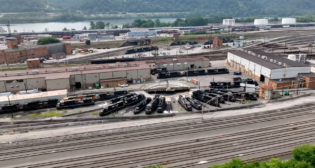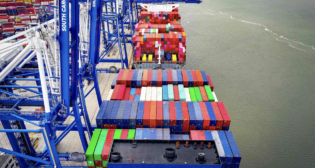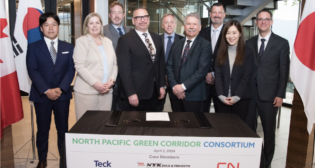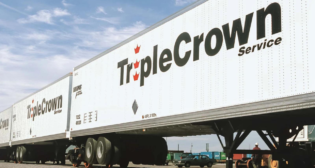
KCS to STB on ‘Managing Intermodal Operations Effectively’
Written by William C. Vantuono, Editor-in-ChiefKansas City Southern President and CEO Pat Ottensmeyer on Aug. 3 responded to Surface Transportation Board Chairman Marty Oberman’s July 22 letter to Class I railroad CEOs requesting information on the extent of congestion at key U.S. container terminals and on their railroads’ policies and practices for assessing container demurrage fees. Oberman cited reports of “substantial charges being levied by the railroads for container storage at these terminals.” Following is KCS’s full response:
Thank you for your letter dated July 22 inquiring about The Kansas City Southern Railway Company’s (KCS) intermodal service and intermodal equipment storage charges (our tariffs use the term “storage” to refer to holding intermodal equipment available for the customer, rather than “demurrage”). The intermodal industry as a whole has faced increasing challenges for several months due to a surge in consumer demand as the national economy continues its recovery from effects of the global COVID-19 pandemic. KCS has managed its intermodal operations effectively despite these many challenges, and the percentage of the units we handle that incur storage charges was only 6.1% over the past year. Consistent with KCS’s policy of preferring to work with customers to avoid storage, rather than collecting storage fees, we have also been flexible in the application of storage charges, where warranted. The answers below to your specific questions provide further detail. (Information provided does not include contractual arrangements, where customers may vary from standard tariff terms.)
(1) The number of “free days” allowed for container storage before demurrage fees begin to accrue: KCS Tariff 6000-F, Item 160, provides that the customer will be notified immediately after the container (or trailer) is unloaded from the train. For customer-controlled equipment, the customer is provided four days of free time, beginning at 12:01 a.m. the day followingnotice of unloading. Container/trailer storage charges on customer-controlled equipment begin to apply only after the lapse of free time. On railroad-controlled equipment (e.g., EMP and TMXU), the customer is allowed two days of free time following the date of notification of unloading. For example, if the customer is notified of unloading on Monday, they have until 11:59 p.m. on Wednesday to remove railroad-controlled equipment from KCS’s intermodal yard without storage charges.
(2) The daily fee schedule after any free days expire: For both customer-controlled and railroad-controlled equipment, the daily storage charge is $100.00 per day following the expiration of free time. The fee does not change as additional chargeable days accrue. This charge has been in effect at least ten years.
(3) Any increase or decrease in such demurrage fees and free time since January 2021: None.
(4) Any fee “caps” that are currently in place and how long those caps are expected to remain in place: There are no fee caps. As storage time on a unit increases, our customer service personnel focus increased attention on encouraging and facilitating the customer’s removal of the equipment from KCS premises. If intermodal equipment remains on KCS premises for more than 16 days, KCS will notify the consignor that the equipment remains on KCS property and needs to be removed immediately. Sometimes these efforts are not successful, however. In September 2020, due to an increasing number of containers accumulating on KCS property, KCS instituted Item 165 in its Tariff KCS 6000-F, notifying customers that equipment left on KCS premises more than 45 days would be deemed abandoned, and would be disposed of according to the terms of the bill of lading or applicable tariff or contract. Quicker action is sometimes required if the equipment is loaded with perishable properly.
(5) Whether receivers are being permitted to provide their own chassis to retrieve their containers: Shippers must provide their own chassis (direct ownership, or via relationship with a leasing company or their drayman) unless the intermodal unit is railroad-controlled. Providing chassis for railroad-controlled equipment is the responsibility of KCS.
(6) A description of efforts made, if any, to reduce storage charges where delay is not within the control of the shipper or receiver: As you recall from the testimony of KCS Executive Vice President and Chief Marketing Officer Mike Naatz before the Board on May 23, 2019, KCS would prefer not to need to charge demurrage for railcars held on our property, and actively works with customers to avoid demurrage when customers are interested in doing so. Similarly, we actively work with shippers on high dwell units to identify the root cause. Where reasonable, fees are adjusted to reflect circumstances. An example of a recent circumstance where we supported the marketplace with flexibility would be the Polar Vortex events that hit the Midwest in February 2021. This event caused significant dislocation in the supply chain, resulting in high dwell that, for both business and safety purposes, we forgave significant amounts of storage to facilitate safe delivery of goods over a protracted period. Additionally, we provided support to shippers concerning COVID-19 related issues during 2020, and for plant shutdowns in the automotive space, as well as at a micro-level, should a shipment have transit or customs documentation issues.
(7) The average daily volume of stored containers, broken out by month from July 2020 to the most recent month for which data is available:
This data represents containers held at KCS’s intermodal ramps, located at Jackson, Miss.; Kansas City, M.; Kendleton, Tex.; Laredo, Tex.; and Wylie, Tex.
Also, you asked us to describe KCS’s policies and practices of assessing storage charges, including the circumstances under which relief can be granted or charges can be excused, and whether charges are imposed even when the receiver is powerless to avoid a delay in retrieving a container. As it does with demurrage, KCS tries to workwith customers to avoid container/trailer storage charges, and grants relief where it is appropriate. As shown by the low percentage of the units we handle that incur storage charges—6.1 % over the past year—we believe that we are successful in working with customers to avoid storage charges. While the reasons for granting relief can depend on a large number of circumstances, over the past year, KCS has granted significant relief from storage charges due to business interruptions from COVID-19, the winter vortex in February 2021, and interruptions in automotive production due to the global chip shortage.
Read more railroad responses to the STB:
• AAR Warns STB About ‘Unintended Consequences’
• BNSF to STB on ‘Maintaining Supply Chain Integrity During Periods of Heightened Volumes’
• CN to STB on ‘Policies that Promote Terminal Fluidity and Service Reliability’
• CP to STB on ‘Logistics Challenges Affecting Intermodal Shippers’
• CSX to STB on “an Efficient and Fluid” Intermodal Terminal Environment
• NS to STB on ‘Policies that Promote Terminal Fluidity and Service Reliability’
• UP to STB: ‘Clearing Our Network Will Take Some Time’



